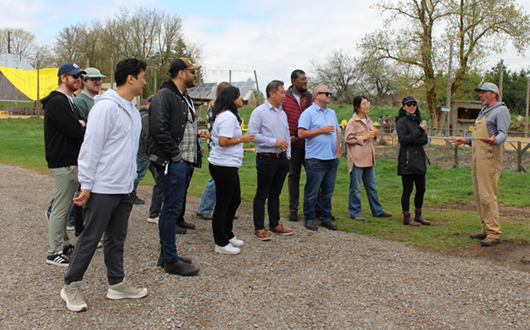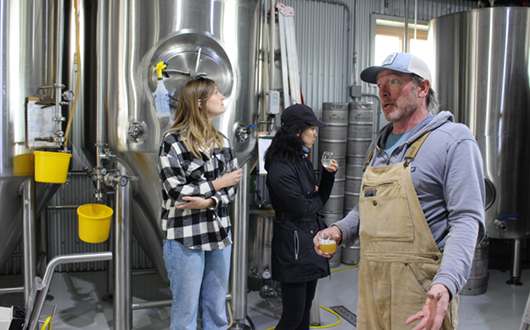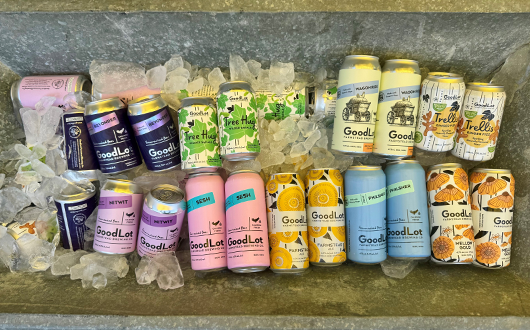We don’t usually think of ourselves primarily as consumers—you probably wouldn’t even call yourself one. But from the moment we wake up until the moment we fall asleep, we’re continuously taking in food, energy, and natural resources. “...the decisions we make today will have an enormous impact on food security and, by extension, on the environment, economy, health, education, peace and human rights.” UN environment programme, 2021.
One company making good decisions is GoodLot Farmstead Brewing Co. They are a regenerative organic hop farm and solar powered brewery in Caledon, Ontario, who added to their sustainability initiatives by joining our bullfrogpowered community a little over a year ago. They go beyond sustainability with practices that revitalize the environment and build community resilience.
After touring the farm during Bullfrog’s mid-year all-staff meeting we sat down with co-founder Phil Winters to chat about what drives their sustainability efforts, the role of Ontario-grown hops, and the many ways they’re building a hyper-local brewery rooted in circular economy principles.
Additional technical details are woven throughout, offering deeper insight into their transformative initiatives.
The GoodLot story
Could you tell us a bit about GoodLot?
GoodLot Farm started growing organic hops for local craft brewers in 2009. We co-founded the Ontario Hop Growers’ Association in 2011 alongside four other hop farms, the only growers in the province at the time. After that, our ability to brew hyper-local, farm-raised beers made with 100% Ontario hops took off. As both farmers and brewers, our goal is simple: add no carbon load to the planet.

Can you tell us more about how the environment fits into your business model?
GoodLot operates under a regenerative carbon farming mindset, working to sequester more carbon in our soil than we emit. Every decision we make is based on these values. Through regenerative farming, we increase the soil’s organic matter and enrich its biology. Nourishing compost and manure support a thriving community of microorganisms that turn nutrients into forms our hops can absorb.
Regenerative agriculture — an approach to growing food that actively restores soil health, primarily by increasing organic matter through a variety of practices. It works to empower farmers and communities by working with natural systems, requiring fewer external inputs, and shortening value chains.
Many of these practices help stabilize our climate by restoring eroded soil biodiversity and storing atmospheric carbon in our soil. It’s one of the most effective ways to decarbonize our food systems and instrumental for realizing 12 of the 17 Sustainable Development Goals.
GoodLot regenerative agriculture practices include:
- No till farming and cover cropping, reducing erosion and water pollution. It also protects the earth from direct sunlight which retains soil moisture.
- No pesticides or herbicides, instead supporting natural pest solutions that protect biodiversity.
- Rotational livestock grazing, allowing animals to move frequently to allow plants to rest and grow while nutrients are spread around the field. By preventing overgrazing, the soil remains covered and reduces erosion.
Our farm-raised beer is crafted in a solar-powered passive-haus, which consumes up to 90% less heating and cooling energy than a conventional building. Passive-haus design is the only internationally recognized and proven science-based energy standard in construction delivering this level of energy savings.
Passive-Haus five principles:
- Super insulated envelopes (what separates the interior from the exterior: exterior walls, roofs, floors, and windows)
- Airtight construction
- High-performance window glazing
- Thermal-bridge-free detailing
- Heat recovery ventilation
We support multiple strategies to create strong local economies and achieve zero waste. Our procurement comes from local suppliers, starting with 100% Ontario hops. Our spent brewing grain goes to Chickadee Hill Farm, just 1.7 km away, where it’s used to feed animals. In turn, we purchase meat from Chickadee for our food program. Our food and container waste is collected by Wastenot Farm, where it’s fed to compost worms and transformed into high-nutrient fertilizer that we use on our hops and food crops.

Circular economy — a model of production and consumption that involves reusing, repairing, and recycling materials to extend their lifespan. The idea is to close the loop and avoid the continuous need for cheap virgin materials and energy by keeping the materials we do have in circulation and out of landfill.
How does your bullfrogpowered status fit into your wider sustainability strategy?
We generate 80% of our electrical demand (we are 100% electric on site – no gas). Bullfrog provides us with the other 20% to complete our clean energy demands annually.
Can you tell us about one of the biggest challenges you’ve faced along your sustainability journey?
There have been a few challenges. We renovated an old barn into a passive-haus brewery. The town didn’t really understand the design principles, and finding contractors who understood the passive-haus approach was not easy. But once we got the Fourth Pig Worker Co-Op on board, our passive haus barn reno became a reality.

As challenging has been our Ontario hop supply. Since we use 100% Ontario hops, we have to contract hops from other local growers aside from our own farm. That supply chain can be difficult, but we are 100% committed to 100% Ontario hops in every beer we make.
Why does GoodLot place such an importance on local-sourcing and revitalizing organic hop growing in Ontario/Canada?
From the start of our operations, keeping the money in our local community has been of paramount importance. This notion of local resilient economic structures ensures that we build a strong local community by constantly investing in our community with our purchasing power.
We can observe, now more than ever, that reliance on far-away partners isn’t always reliable. Building our community with our hard-earned dollars has a multiplying impact on everyone around our farm and local small towns in Caledon.
Raise a glass to local change
You can purchase GoodLot beer through their online shop, at the LCBO, and The Beer Store. You can also visit their brewery, which holds three venues and includes two outdoor beer gardens.
So when you raise your next glass, know that you’re toasting not just good beer, but a stronger, healthier, and more resilient future for our community.
Resources
“Circular economy: Definition, importance and benefits." European Parliament, 24 May 2023, European Parliament, https://www.europarl.europa.eu/topics/en/article/20151201STO05603/circular-economy-definition-importance-and-benefits. Accessed 11 Aug. 2025.
“Five Principles of Passive House Design and Construction.” Passive House Accelerator, passivehouseaccelerator.com/articles/five-principles-of-passive-house-design-and-construction. Accessed 11 Aug. 2025.
Nerger, Matt. “What Is Regenerative Agriculture?” Rainforest Alliance, 30 May 2025, www.rainforest-alliance.org/insights/what-is-regenerative-agriculture/.
“Regenerative Food Systems.” The Nature Conservancy, 2025, www.nature.org/en-us/what-we-do/our-priorities/provide-food-and-water-sustainably/food-and-water-stories/regenerative-food-systems/. Accessed 13 Aug. 2025.
“Rethinking Food Systems.” United Nations Environment Programme. UNEP, 4 June 2021, www.unep.org/news-and-stories/story/rethinking-food-systems.
